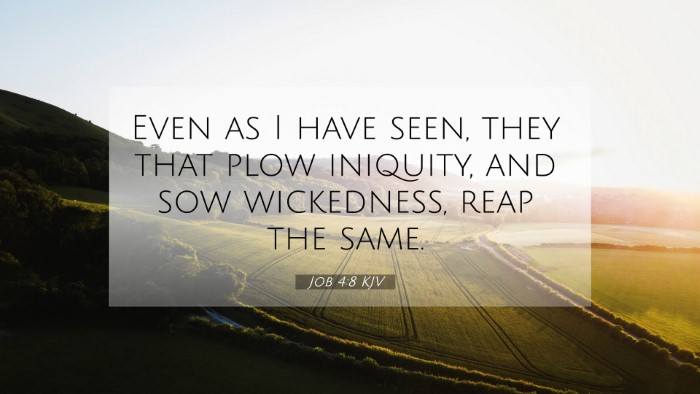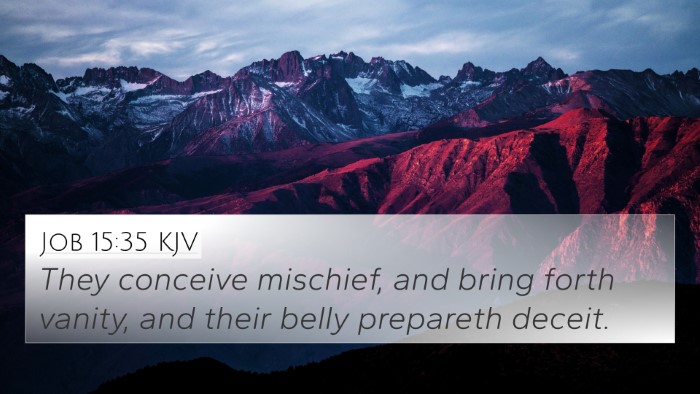Old Testament
Genesis Exodus Leviticus Numbers Deuteronomy Joshua Judges Ruth 1 Samuel 2 Samuel 1 Kings 2 Kings 1 Chronicles 2 Chronicles Ezra Nehemiah Esther Job Psalms Proverbs Ecclesiastes Song of Solomon Isaiah Jeremiah Lamentations Ezekiel Daniel Hosea Joel Amos Obadiah Jonah Micah Nahum Habakkuk Zephaniah Haggai Zechariah MalachiJob 4:8 Similar Verses
Job 4:8 Cross References
Even as I have seen, they that plow iniquity, and sow wickedness, reap the same.
Uncover the Rich Themes and Topics of This Bible Verse
Listed below are the Bible themes associated with Job 4:8. We invite you to explore each theme to gain deeper insights into the Scriptures.
Job 4:8 Cross Reference Verses
This section features a detailed cross-reference designed to enrich your understanding of the Scriptures. Below, you will find carefully selected verses that echo the themes and teachings related to Job 4:8 KJV. Click on any image to explore detailed analyses of related Bible verses and uncover deeper theological insights.
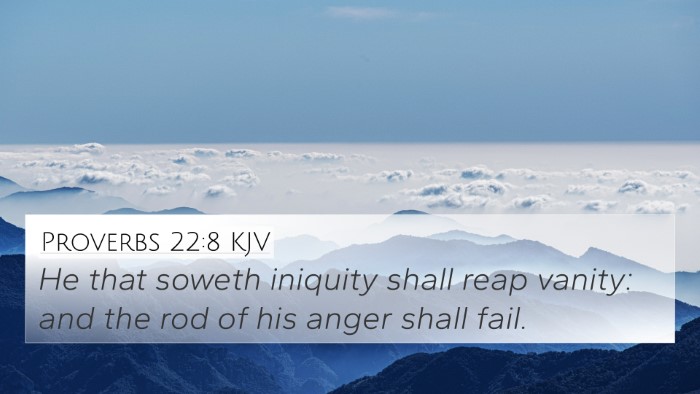
Proverbs 22:8 (KJV) »
He that soweth iniquity shall reap vanity: and the rod of his anger shall fail.
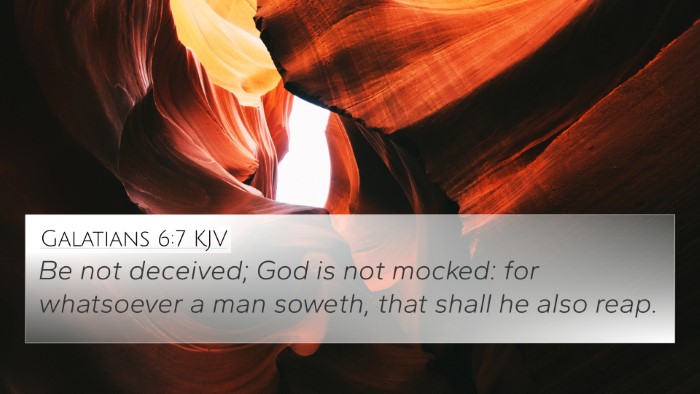
Galatians 6:7 (KJV) »
Be not deceived; God is not mocked: for whatsoever a man soweth, that shall he also reap.
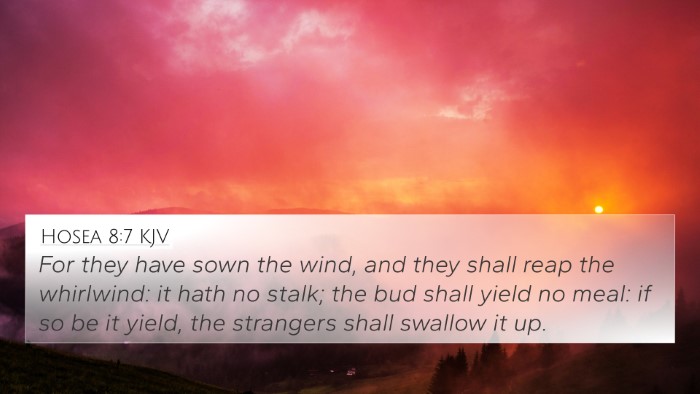
Hosea 8:7 (KJV) »
For they have sown the wind, and they shall reap the whirlwind: it hath no stalk; the bud shall yield no meal: if so be it yield, the strangers shall swallow it up.

Jeremiah 4:18 (KJV) »
Thy way and thy doings have procured these things unto thee; this is thy wickedness, because it is bitter, because it reacheth unto thine heart.
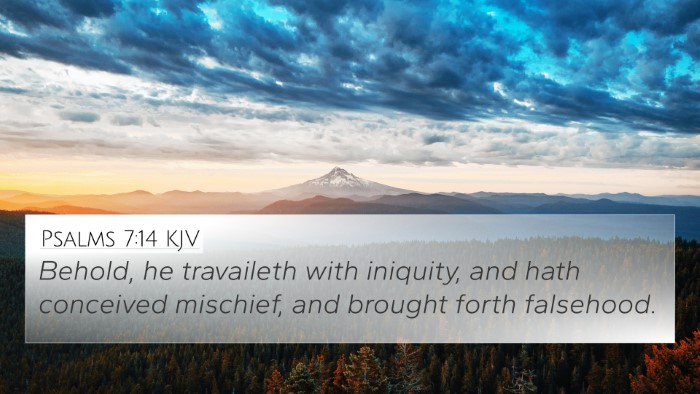
Psalms 7:14 (KJV) »
Behold, he travaileth with iniquity, and hath conceived mischief, and brought forth falsehood.

Hosea 10:12 (KJV) »
Sow to yourselves in righteousness, reap in mercy; break up your fallow ground: for it is time to seek the LORD, till he come and rain righteousness upon you.
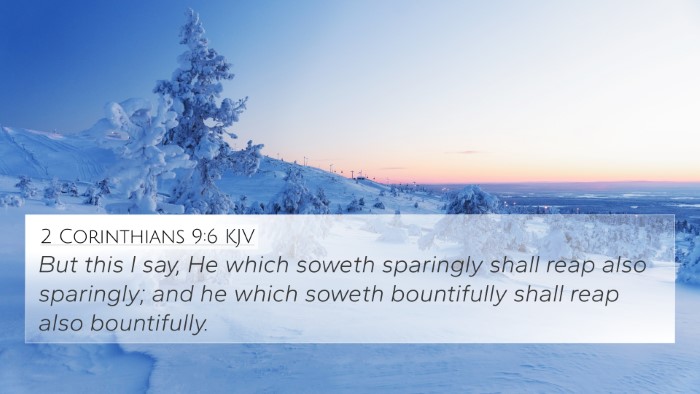
2 Corinthians 9:6 (KJV) »
But this I say, He which soweth sparingly shall reap also sparingly; and he which soweth bountifully shall reap also bountifully.
Job 4:8 Verse Analysis and Similar Verses
Understanding Job 4:8
Job 4:8 states: "Even as I have seen, they that plow iniquity, and sow wickedness, reap the same." This verse articulates a fundamental principle of divine justice and the moral order that governs the universe. Let us delve deeper into its meaning by synthesizing insights from various public domain commentaries.
Interpretation of Job 4:8
In this verse, Eliphaz the Temanite responds to Job's plight, suggesting that he has witnessed in his experience that those who engage in wrongdoings ultimately face consequences. This reflects the principle of divine retribution, an idea present in many parts of Scripture.
Key Themes
- Reap What You Sow: The notion that one's actions have consequences permeates much of biblical thought, echoing the sentiments found in Galatians 6:7-8, which affirms that God does not allow a person to be mocked, for a man reaps what he sows.
- Moral Order: The moral cosmos is upheld by the idea that wickedness inevitably leads to suffering, a theme reinforced in Proverbs 22:8.
- Human Observation of Justice: Eliphaz’s claim is based on personal observation, highlighting humanity's experience with divine justice, a principle discussed in Ecclesiastes 8:14.
Cross References
The following Bible verses highlight connections to the themes expressed in Job 4:8 and help further the understanding of its implications:
- Galatians 6:7-8: "For whatever a man sows, that he will also reap." This scripture reaffirms the principle of consequences for one's actions.
- Proverbs 22:8: "He who sows iniquity will reap sorrow." This directly parallels Job 4:8 by emphasizing the inevitability of consequences.
- Ecclesiastes 8:14: This verse discusses the apparent injustices in the world, contributing a nuanced understanding of the moral order.
- Hosea 8:7: "For they have sown the wind, and they shall reap the whirlwind." This metaphorical language reinforces the concept of sowing and reaping.
- James 3:18: "Now the fruit of righteousness is sown in peace by those who make peace." Here, the outcomes of righteous actions are duly noted.
- Matthew 7:16: "You will know them by their fruits." This illustrates how one's actions reveal their true nature.
- Psalm 37:1-2: These verses encourage believers not to fret over evildoers, as they will eventually fade away, reinforcing homegrown justice.
- 2 Corinthians 5:10: "For we must all appear before the judgment seat of Christ…" This verse emphasizes accountability, tying into the overarching theme of reaping and sowing.
- Proverbs 11:18: "The wicked do deceptive work, but he who sows righteousness will have a sure reward." The contrast solidifies the truth of Job 4:8.
- Revelation 20:12: "And I saw the dead, small and great, standing before God, and books were opened…" This depicts the ultimate divine judgment, confirming the law of reaping and sowing.
Insights from Commentaries
Matthew Henry's Commentary
Matthew Henry emphasizes that this verse highlights God’s justice. He asserts that the moral fabric of the universe is such that iniquity leads to inevitable ruin. Henry underscores the wisdom of observing outcomes, as it teaches about divine providence.
Albert Barnes' Notes
Albert Barnes expands on the idea of cause and effect in moral behavior, reflecting normative ethics as promulgated throughout the scriptures. Barnes reiterates the relevance of the agrarian metaphor to illustrate spiritual truths about sowing and reaping, as it would have resonated deeply with the readers of that time.
Adam Clarke's Commentary
Adam Clarke elucidates on the implications of the verse, noting that Job's friends, particularly Eliphaz, impose a simplistic view of righteousness versus suffering on Job’s complex situation. Clarke details how this viewpoint neglects the nuanced reality of divine justice that sometimes allows for suffering without direct cause.
Application of Job 4:8
This verse, along with its related scriptures, serves as a powerful reminder to cultivate a righteous life, recognizing that there are consequences for our actions. The principle of reaping and sowing encourages believers to pursue righteousness and avoid wickedness, fostering a life aligned with God's will.
Conclusion
In summary, Job 4:8 encapsulates vital truths about divine justice and the repercussions of our actions. By cross-referencing this verse with others, one gains deeper insights into the biblical doctrine of moral accountability. Such understanding is essential for anyone studying the interconnectedness of scriptures, particularly in the rich, complex landscape of the Bible.
Tools and Resources for Cross-Referencing
For those interested in exploring cross-referencing further, various tools can aid in studying the Bible's interconnections:
- Bible Concordance: A valuable tool that lists words and their occurrences throughout the Bible, aiding in the discovery of related verses.
- Bible Cross-Reference Guide: Resources that provide thematic relationships between verses for deeper understanding.
- Cross-Reference Bible Study: Methods and practices that encourage a holistic approach to studying scripture.
- How to Use Bible Cross-References: Guidelines that facilitate effective engagement with interconnected verses.
- Bible Reference Resources: Comprehensive materials that allow for extensive scripture exploration.


